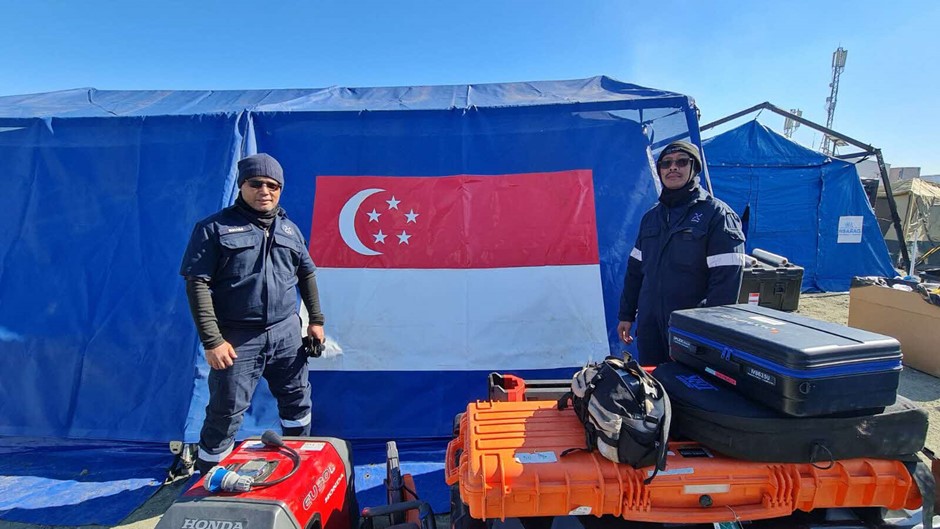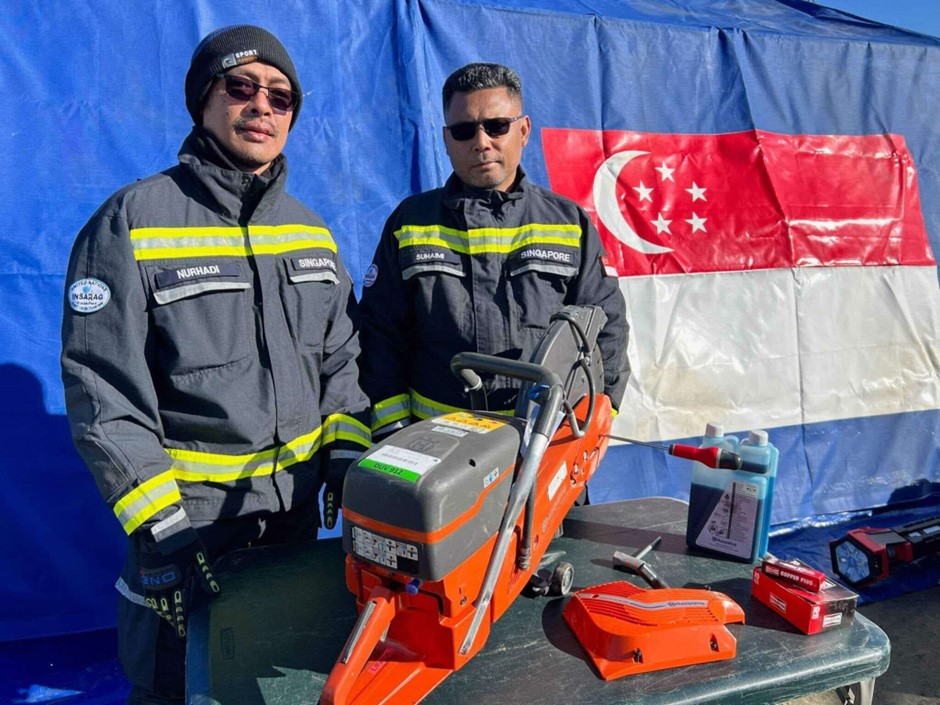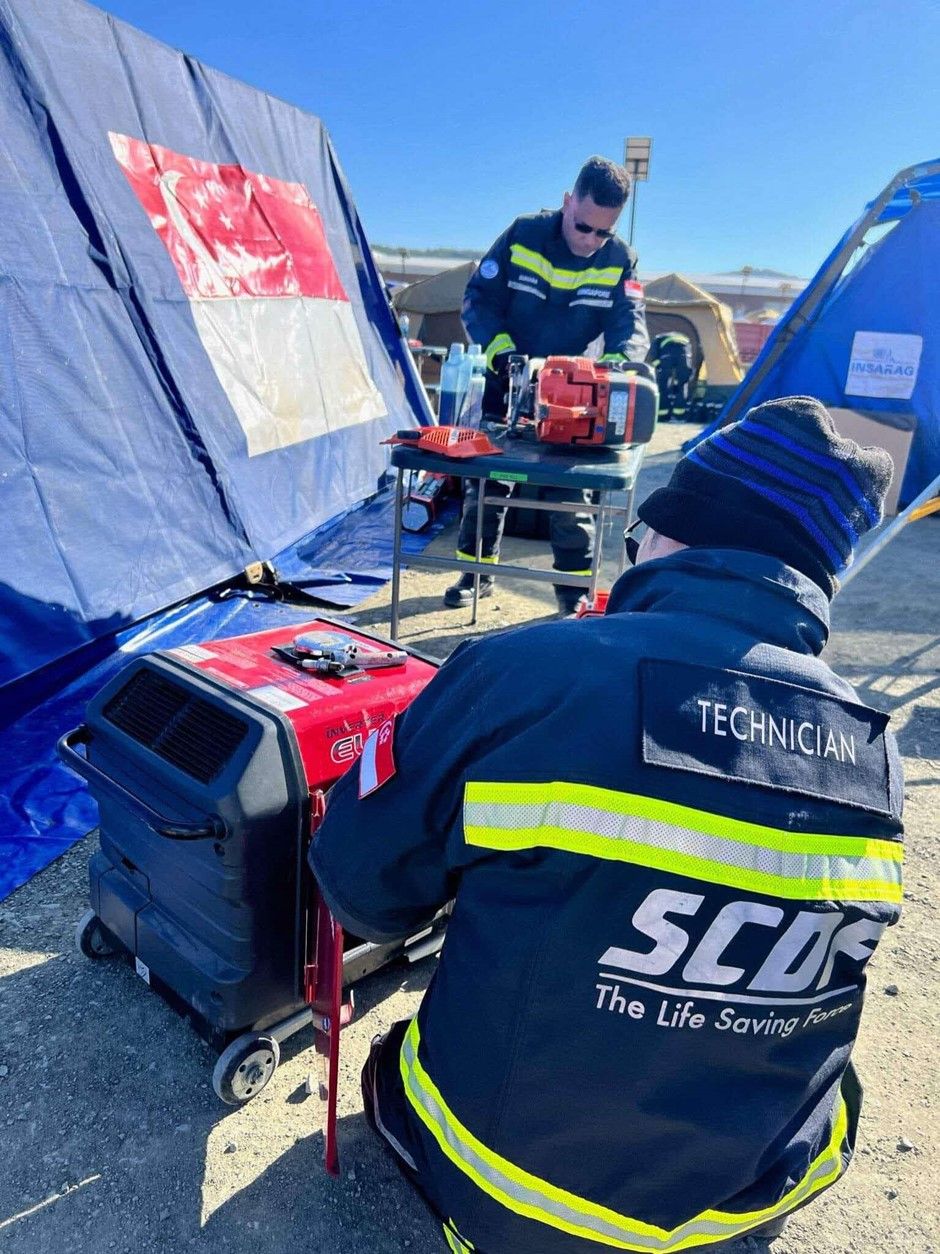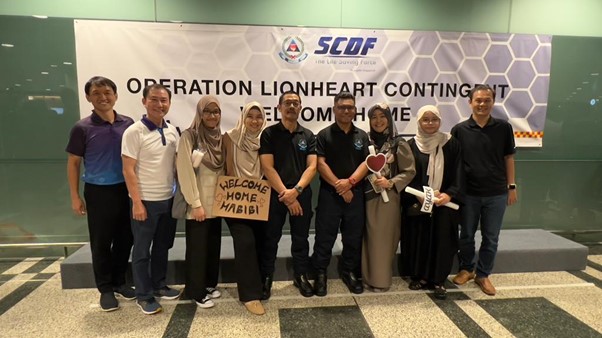Operation Lionheart’s 20th mission marks a new milestone for HTX.

Suhaimi Bin Da’ed (left) and Nurhadi Bin Eeban (right) at the Base of Operations (Photo: SCDF)
Operation Lionheart's deployment to Türkiye following the magnitude 7.8 and 7.7 earthquakes which struck on 6 February 2023 included two HTX technical specialists from Platform Systems: Suhaimi Bin Da’ed and Nurhadi Bin Eeban. This made the mission HTX’s first deployment to Operation Lionheart.
Operation Lionheart is the SCDF’s dedicated contingent of search-and-rescue experts and support personnel who can be rapidly deployed to international disaster zones. This contingent includes members of the elite Disaster Assistance & Rescue Team (DART) and other frontline units, as well as supporting officers from SCDF Headquarters (HQ SCDF). Members of this contingent are on quarterly standby, and when activated only have two hours to get to HQ SCDF for briefing, equipping, and deployment. (As such, those on standby have to keep their passports with them at all times, and they and their families have to be mentally prepared for sudden deployments to disaster zones.)
Formed in 1990, the mission to Türkiye was Operation Lionheart’s 20th mission. While this was Suhaimi and Nurhadi’s first Operation Lionheart deployment as HTX personnel, this was actually not their first mission with Operation Lionheart. Türkiye was in fact Suhaimi’s fifth Operation Lionheart deployment and Nurhadi’s fourth – both had previously been deployed as members of the SCDF Logistics Department.
Reflecting on their previous Operation Lionheart missions, including missions to flood disasters in Indonesia and Laos, Suhaimi and Nurhadi observed that “every deployment has its own experience.” For them, the mission to Türkiye was “another new experience altogether,” where repairing the contingent’s equipment in the subzero temperatures – which at times reached -9°C – turned out to be “the most challenging and best experience.”
The subzero temperatures were a challenge for the Operation Lionheart contingent because of their tentage shelters, which meant that they were constantly exposed to the cold. As the search-and-rescue teams had to be within 10 minutes travel time from the base of operations, their base was located in the rubble of Kahramanmaraş in southern Türkiye, one of the worst-hit cities in the earthquake disaster zone.

Nurhadi (left) and Suhaimi (right) at the Base of Operations (Photo: SCDF)
Because the earthquakes had shattered the region’s power grid, electricity had to be generated on site. Apart from maintaining and repairing the rescue teams’ equipment, such as lifting and cutting tools, Suhaimi and Nurhadi also ensured that the portable generators used to generate electricity at the base remained in good condition, along with other essential equipment such as the lighting systems.
Before the portable generators had arrived at the base, Suhaimi and Nurhadi recalled that the surviving residents of Kahramanmaraş and volunteers from other countries had generously shared their limited supplies of hot water, coffee, tea, and firewood with the Operation Lionheart contingent.
 Maintenance of a portable power generator and a power saw (Photo: SCDF)
Maintenance of a portable power generator and a power saw (Photo: SCDF)
It was not only the power grid that was destroyed by the earthquakes. The region’s water and sewage lines were destroyed as well. The Operation Lionheart contingent not only had to survive on bottled water; they also had to forego showers during the entire 9-day period of their deployment.
While some aid agencies operating in the area had set up several portable toilets, these facilities were shared by over 100 international rescue teams based in Kahramanmaraş, so the primary toilet facilities used by the Operation Lionheart contingent consisted of dry toilets. (In other words, plastic bags treated with chemicals to sterilise the excrement!)
Apart from their technical work, Suhaimi and Nurhadi went beyond their duties and helped the rescuers by preparing hot meals of instant noodles and canned food. For the search-and-rescue teams, these hot meals were very welcome especially after the long hours in the cold weather searching through the dangerous rubble for survivors.
Given the difficult living conditions, Suhaimi and Nurhadi noted that a big change in mindset was essential. Those deployed to Operation Lionheart must be mentally prepared for the lack of basic amenities. They must be laser-focused on the rescue mission and not think about the lack of comfort. In this harsh environment, their main challenge was to be able to “deliver the best when needed.”
In view of the tremendous mental stress, the Operation Lionheart contingent included a two-member psychological team who provided counselling and psychological support to anyone who needed it. What also helped the Operation Lionheart team were the successful rescues of survivors from the rubble, including the rescue of a boy from a collapsed building. These successes boosted morale and reinforced their sense of mission.

Homecoming (Photo: Suhaimi Bin Da’ed and Nurhadi Bin Eeban)
After their 9-day mission, Operation Lionheart returned to Singapore on 18 February 2023. Before the contingent left their base of operations, they donated essential supplies such as medicines, thermal wear, and tents to the Türkiye National Medical Rescue Team. This marked the close of a successful mission and a new milestone for HTX.
Learn More: